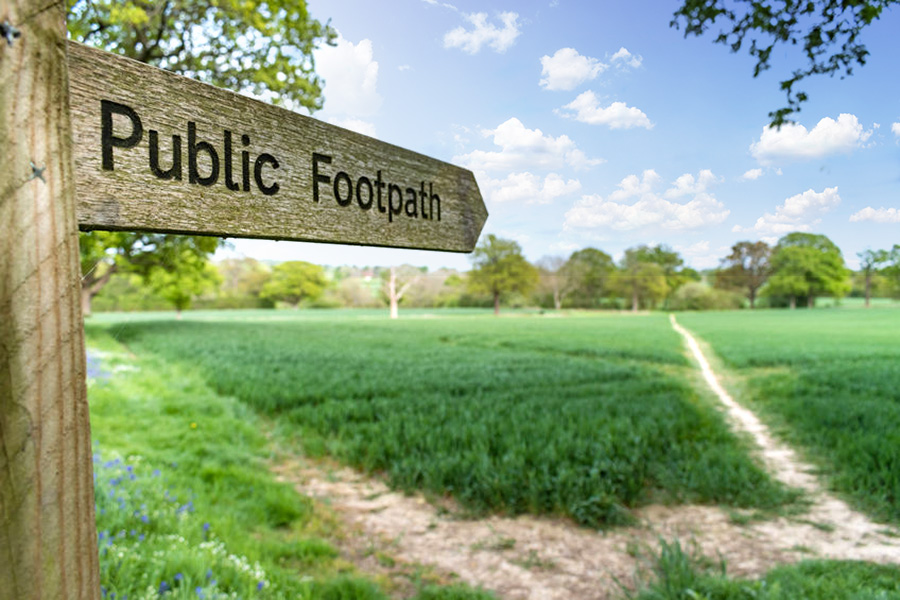It’s no secret that the countryside and the UK’s 150,000 miles of Public Rights of Way (PRoW) have seen a huge increase in use as a result the Covid-19 lockdowns. However, this new-found interest in the outdoors comes as a double-edged sword for landowners, farmers and estate managers.
As we all know, access to and enjoyment of the countryside is hugely beneficial to physical and mental health. And a new-found interest in what the UK countryside offers will have significant benefits to the rural economy.
But recent news stories have highlighted the issues caused by the rise in use of rural footpaths, bridleways and cycle paths.
Trespass and poorly or illegally parked cars around popular walking spots have increased ten-fold. BBQs, fires and litter caused havoc with livestock, crops and pasture.
People wearing inappropriate footwear trying to steer clear of mud and puddles end up making paths ever wider and negatively impacting surrounding crop yields.
Dog attacks on livestock have increased and are likely to only get worse throughout lambing season.
Experts from the Countryside Landowners Association (CLA), the Department for Environment, Food, and Rural Affairs (DEFRA) and the National Farmers Union say a decrease in footfall will not happen anytime soon.
Action must be therefore be taken to prevent damage to the countryside, to farmed and wild animals – and potentially to visitors themselves.
Members of the public need to play a greater part in easing the pressure on the countryside, and reducing the risk of harm to both themselves and livestock.
DEFRA have been utilising social media platforms such as Snapchat to help educate the public and increase awareness. And the CLA have recently written to the government pleading for the Countryside Code to the taught in schools to inform coming generations of the importance of their behaviour in the countryside.
In the meantime, however, it falls to landowners, farmers and estate managers to help preserve and maintain and safe access to (and resposible use of) the countryside.
What you can and should do as a farmer, landowner or estate manager
If you have a bridleway, cycle path or footpath running across your land, you are responsible for maintaining access and looking after the ‘furniture’ (such as gates and fences).
Gain help from your local authority
The good news is that landowners can apply to their local council for a grant of up to 25% of the costs incurred from maintaining PRoW furniture.
Additional good news (in theory) is that the responsibility for the surface of the PRoW falls on the local highways authority, not the landowner. But this is only the case where the surface is maintained at the public’s expense.
Reduce risk around your livestock
You can deploy extra signage to help encourage correct and responsible use of PRoW’s across your land. This could include displaying the Countryside Code, or making people aware of the times of year that a bull or lambs are in a particular field. Any signage should be informative and ‘non-deterring’ (i.e. it should not imply that people cannot not use the right of way).
Owners of livestock that injure or fatally wound the public now face increased fines and penalties of up to £500,000. Particularly aggressive members of a herd or flock should therefore not be placed anywhere near the public as an attempt to discourage use of PRoW.
The Health and Safety Executive (HSE) provides farmers and landowners with advice on the best ways to minimise risk to the public and livestock on a useful document called Sheet 17.
Apply for a PRoW diversion
The easiest way for you to keep the public safe and negate risk is to divert paths around potentially risky livestock, or around footpaths that have been damaged through overuse.
You can apply to your local authority for a temporary diversion – and the process for the additions, removals and alterations of PRoW will be made increasingly easy by the incoming Right of Way Reform Act.
It is also crucial to ensure your particular PRoW is registered with your local council. This helps prevent people exploiting previously used permissive routes or areas of your land they may have walked through for years unchallenged.
You can register your PRoW, check it is registered, or register a change of route via your county council’s website. Those in our region include the following:

